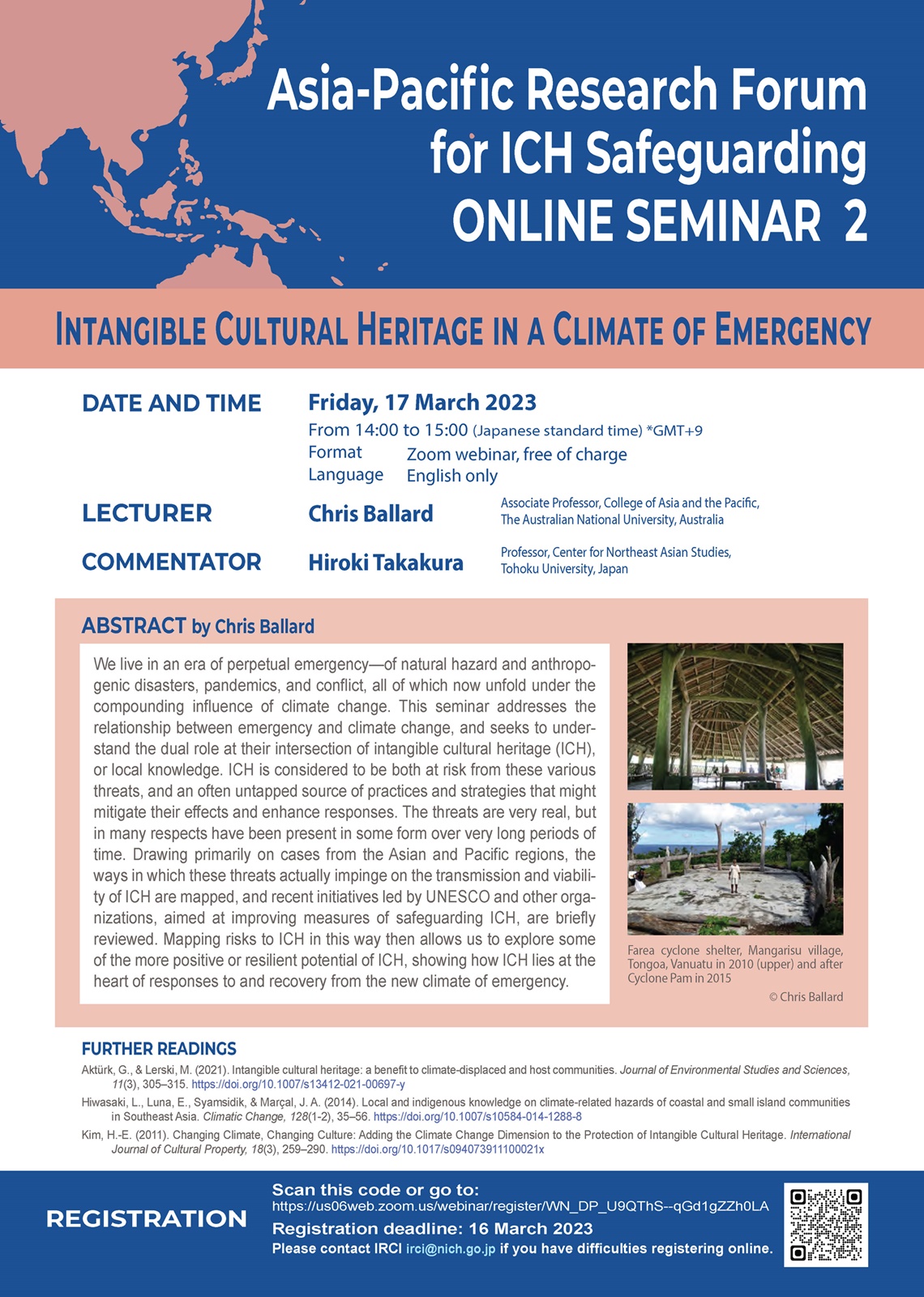EVENTS
22/02/2023
The second online seminar for safeguarding ICH in the Asia-Pacific region will be held on 17 March 2023
As the first programme offered by ‘Asia-Pacific Research Forum for ICH Safeguarding’, online seminar series addressing various issues and latest trends in ICH research in the Asia-Pacific region was launched by IRCI in December 2022. Its second seminar will be held on 17 March 2023. Inviting Mr Chris Ballard as a lecturer, the second seminar discusses issues relating to ICH in emergencies and climate change.
Online Seminar 2
Intangible Cultural Heritage in a Climate of Emergency
Date and time:
Friday, 17 March 2023 14:00–15:00(JST)*GMT+9
Zoom Webinar
Language: English
Lecturer:
Chris Ballard (Associate Professor, College of Asia and the Pacific, The Australian National University, Australia)
Commentator:
Hiroki Takakura (Professor, Center for Northeast Asian Studies, Tohoku University, Japan)
For the abstract of the presentation and profiles, please see below.
Registration:
Registration (free of charge) is required for participating in the seminar.
This seminar is open to the public, and anyone interested in the topic is welcome to join.
Please register from:
https://us06web.zoom.us/webinar/register/WN_DP_U9QThS–qGd1gZZh0LA
*Registration deadline: 16 March 2023
Please contact IRCI if you have difficulties registering online.
*The Forum has been established under IRCI’s research project, ‘Creation of the Asia-Pacific Regional Hub of Research for the Safeguarding of ICH’ (FY 2022–2026).
Contact:
IRCI Secretariat
TEL:+81-72-275-8050
FAX:+81-72-275-8151
E-mail: irci@nich.go.jp
Intangible Cultural Heritage in a Climate of Emergency
Abstract by Chris Ballard
We live in an era of perpetual emergency—of natural hazard and anthropogenic disasters, pandemics, and conflict, all of which now unfold under the compounding influence of climate change. This seminar addresses the relationship between emergency and climate change, and seeks to understand the dual role at their intersection of intangible cultural heritage (ICH), or local knowledge. ICH is considered to be both at risk from these various threats, and an often untapped source of practices and strategies that might mitigate their effects and enhance responses. The threats are very real, but in many respects have been present in some form over very long periods of time. Drawing primarily on cases from the Asian and Pacific regions, the ways in which these threats actually impinge on the transmission and viability of ICH are mapped, and recent initiatives led by UNESCO and other organizations, aimed at improving measures of safeguarding ICH, are briefly reviewed. Mapping risks to ICH in this way then allows us to explore some of the more positive or resilient potential of ICH, showing how ICH lies at the heart of responses to and recovery from the new climate of emergency.
Further readings:
Aktürk, G., & Lerski, M. (2021). Intangible cultural heritage: a benefit to climate-displaced and host communities. Journal of Environmental Studies and Sciences, 11(3), 305–315. https://doi.org/10.1007/s13412-021-00697-y
Hiwasaki, L., Luna, E., Syamsidik, & Marçal, J. A. (2014). Local and indigenous knowledge on climate-related hazards of coastal and small island communities in Southeast Asia. Climatic Change, 128(1-2), 35–56. https://doi.org/10.1007/s10584-014-1288-8
Kim, H.-E. (2011). Changing Climate, Changing Culture: Adding the Climate Change Dimension to the Protection of Intangible Cultural Heritage. International Journal of Cultural Property, 18(3), 259–290. https://doi.org/10.1017/s094073911100021x
Profiles
Chris Ballard (Associate Professor, College of Asia and the Pacific, The Australian National University, Australia)
Chris Ballard is a historian at The Australian National University Canberra. Since the 1980s, his research has focused on the oral histories of communities in Papua New Guinea, West Papua, Vanuatu and other Pacific islands. Together with Dr Meredith Wilson, he has worked since 2004 with the Lelema community of Vanuatu on the inscription and management of the World Heritage site of Chief Roi Mata’s Domain. Starting in 2016, he has worked with UNESCO on the relationship between intangible cultural heritage, or local knowledge, and emergencies (including natural hazards, epidemics and conflict), and is currently preparing a report for UNESCO on ICH and climate change.
Hiroki Takakura (Professor, Center for Northeast Asian Studies, Tohoku University, Japan)
Hiroki Takakura is Professor of Social Anthropology at Tohoku University, Japan. His main research field is Siberian Anthropology, the domestication history, and the indigenous affairs. After Japan Disaster 2011, Takakura started the disaster anthropological studies in Japan, which results will be published as “Anthropology and Disaster in Japan” from the Routledge in the spring 2023.
- ARCHIVE
- CATEGORY
- Research Data Collection
- Creation of Research Forum
- SDGs
- Climate change
- Natural hazards
- COVID-19 Pandemic
- Endangered ICH
- Post-conflict
- Legal systems
- Documentation
- Conferences/Meetings
- Seminars
- Symposiums/Forums
- Workshop/Working sessions
- Field research
- Information
- Visits
- Publications
- YouTube
- C2Centre
- UNESCO
- Cooperation-with-Sakai-city
- Governing Board Meetings
- Others




